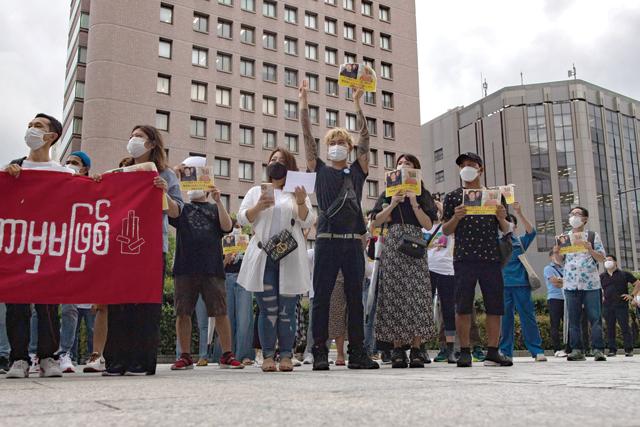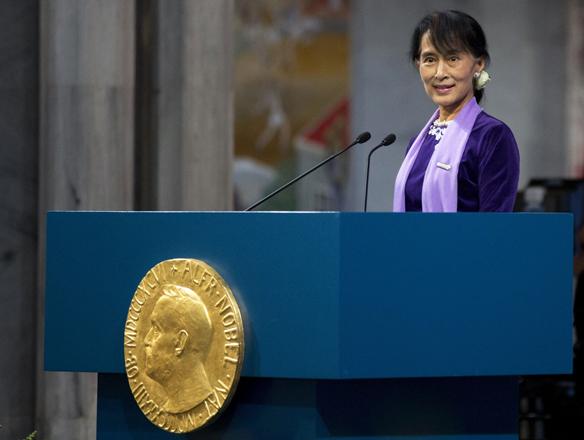You are here
Myanmar junta executes two leading pro-democracy figures
By AFP - Jul 25,2022 - Last updated at Jul 25,2022
YANGON — Myanmar's junta has executed four prisoners including a former lawmaker from Aung San Suu Kyi's party and a prominent activist, state media said on Monday, in the country's first use of capital punishment in decades.
The executions sparked widespread condemnation, including from the United States and France, heightened fears that more death sentences will follow, and prompted calls for the international community to take sterner measures against the already-isolated junta.
The four were executed for leading "brutal and inhumane terror acts", the Global New Light of Myanmar newspaper said, without saying when or how the men were killed.
The junta has sentenced dozens of anti-coup activists to death as part of its crackdown on dissent after seizing power last year, but Myanmar had not carried out an execution for decades.
Phyo Zeya Thaw, a former lawmaker from Suu Kyi's National League for Democracy (NLD) who was arrested in November, was sentenced to death in January for offences under anti-terrorism laws.
Democracy activist Kyaw Min Yu, better known as "Jimmy", received the same sentence from the military tribunal.
Family members of the two men gathered outside Yangon’s Insein prison after news of the executions was published, in the hope of retrieving their bodies, local media reported.
The two other men were sentenced to death for killing a woman they alleged was an informer for the junta in Yangon.
The NLD, which won a landslide in 2020 elections before being ousted by the military months later, said it was “devastated” by the news.
Responding to media enquiries on reports of the executions, a junta statement said “it is as stated in the state media”.
Diplomatic condemnation
The executions drew immediate condemnation from the United States, which slammed the regime for the “execution of pro-democracy leaders and elected officials for exercising their fundamental freedoms”.
“We join the people of Myanmar in mourning,” the US embassy in Yangon said in a statement.
Japan’s government — a major provider of economic assistance to Myanmar — said it “seriously deplores” the executions.
France called the executions “a major regression and another phase in the escalating atrocities committed by the Myanmar junta since the coup d’etat”.
The sentiment was echoed by United Nations human rights chief Michelle Bachelet.
“This cruel and regressive step is an extension of the military’s ongoing repressive campaign against its own people,” she said in a statement Monday, slamming the military for showing “no regard for human rights”.
UN rights workers have said that under the junta’s martial law provisions, the death penalty could be given for 23 “vague and broadly defined offences”, which in practice could include any criticism of the military.
Myanmar expert Richard Horsey of the International Crisis Group (ICG) said on Twitter that the executions were “an outrageous act. And one that will create political shockwaves, now and for a long time to come”.
The United Nations’ Special Rapporteur on Myanmar Tom Andrews said the “depraved acts must be a turning point”.
“What more must the junta do before the international community is willing to take strong action?” he said.
A history of activism
According to Amnesty International, around 100 others are currently on death row after being convicted in junta courts.
But Phyo Zeya Thaw and Kyaw Min Yu were among the most prominent.
A hip-hop pioneer whose subversive rhymes irked the previous junta, Phyo Zeya Thaw was jailed in 2008 for membership of an illegal organisation and possession of foreign currency.
He was elected to parliament representing the NLD in the 2015 elections, which ushered in a transition to civilian rule.
The junta accused him of orchestrating several attacks on regime forces, including a gun attack on a commuter train in Yangon in August that killed five policemen.
Kyaw Min Yu rose to prominence during Myanmar’s 1988 student uprising against the country’s previous military regime, and had spent more than a dozen years in and out of prison under the previous junta for his pro-democracy activism.
The 53-year-old was arrested in an overnight raid in October.
The country’s military alleged voter fraud during the 2020 elections as justification for its coup on February 1 last year.
Suu Kyi has been detained since then and faces a slew of charges in a junta court that could see her face a prison sentence of more than 150 years.
The Nobel laureate, 77, learned of the executions at her latest hearing on Monday, a source with knowledge of the matter said.
She did not comment on the news but “looked sad”, the source said.
Related Articles
YANGON — Myanmar's junta lashed out on Tuesday against international condemnation of the country's first use of capital punishment in decade
NAYPYITAW — Myanmar's parliament elected a close friend and confidant of Nobel laureate Aung San Suu Kyi as president on Tuesday, making Hti
NAYPYIDAW, Myanmar — Ousted Myanmar leader Aung San Suu Kyi is expected to hear the verdict in her incitement trial on Tuesday, the first in

















